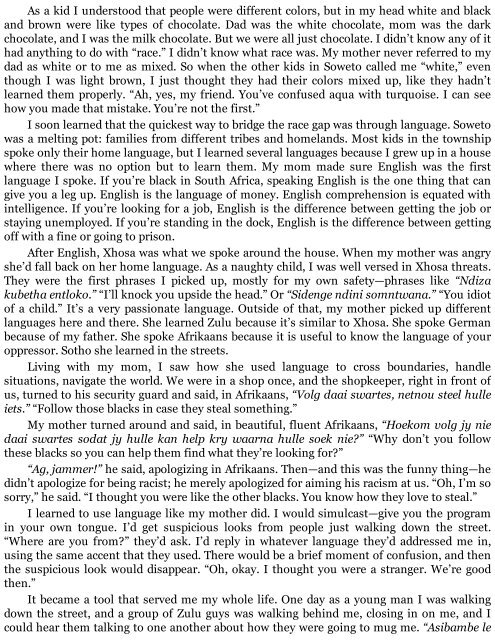You also want an ePaper? Increase the reach of your titles
YUMPU automatically turns print PDFs into web optimized ePapers that Google loves.
As a kid I understood that people were different colors, but in my head white and black<br />
and brown were like types of chocolate. Dad was the white chocolate, mom was the dark<br />
chocolate, and I was the milk chocolate. But we were all just chocolate. I didn’t know any of it<br />
had anything to do with “race.” I didn’t know what race was. My mother never referred to my<br />
dad as white or to me as mixed. So when the other kids in Soweto called me “white,” even<br />
though I was light brown, I just thought they had their colors mixed up, like they hadn’t<br />
learned them properly. “Ah, yes, my friend. You’ve confused aqua with turquoise. I can see<br />
how you made that mistake. You’re not the first.”<br />
I soon learned that the quickest way to bridge the race gap was through language. Soweto<br />
was a melting pot: families from different tribes and homelands. Most kids in the township<br />
spoke only their home language, but I learned several languages because I grew up in a house<br />
where there was no option but to learn them. My mom made sure English was the first<br />
language I spoke. If you’re black in South Africa, speaking English is the one thing that can<br />
give you a leg up. English is the language of money. English comprehension is equated with<br />
intelligence. If you’re looking for a job, English is the difference between getting the job or<br />
staying unemployed. If you’re standing in the dock, English is the difference between getting<br />
off with a fine or going to prison.<br />
After English, Xhosa was what we spoke around the house. When my mother was angry<br />
she’d fall back on her home language. As a naughty child, I was well versed in Xhosa threats.<br />
They were the first phrases I picked up, mostly for my own safety—phrases like “Ndiza<br />
kubetha entloko.” “I’ll knock you upside the head.” Or “Sidenge ndini somntwana.” “You idiot<br />
of a child.” It’s a very passionate language. Outside of that, my mother picked up different<br />
languages here and there. She learned Zulu because it’s similar to Xhosa. She spoke German<br />
because of my father. She spoke Afrikaans because it is useful to know the language of your<br />
oppressor. Sotho she learned in the streets.<br />
Living with my mom, I saw how she used language to cross boundaries, handle<br />
situations, navigate the world. We were in a shop once, and the shopkeeper, right in front of<br />
us, turned to his security guard and said, in Afrikaans, “Volg daai swartes, netnou steel hulle<br />
iets.” “Follow those blacks in case they steal something.”<br />
My mother turned around and said, in beautiful, fluent Afrikaans, “Hoekom volg jy nie<br />
daai swartes sodat jy hulle kan help kry waarna hulle soek nie?” “Why don’t you follow<br />
these blacks so you can help them find what they’re looking for?”<br />
“Ag, jammer!” he said, apologizing in Afrikaans. Then—and this was the funny thing—he<br />
didn’t apologize for being racist; he merely apologized for aiming his racism at us. “Oh, I’m so<br />
sorry,” he said. “I thought you were like the other blacks. You know how they love to steal.”<br />
I learned to use language like my mother did. I would simulcast—give you the program<br />
in your own tongue. I’d get suspicious looks from people just walking down the street.<br />
“Where are you from?” they’d ask. I’d reply in whatever language they’d addressed me in,<br />
using the same accent that they used. There would be a brief moment of confusion, and then<br />
the suspicious look would disappear. “Oh, okay. I thought you were a stranger. We’re good<br />
then.”<br />
It became a tool that served me my whole life. One day as a young man I was walking<br />
down the street, and a group of Zulu guys was walking behind me, closing in on me, and I<br />
could hear them talking to one another about how they were going to mug me. “Asibambe le
















